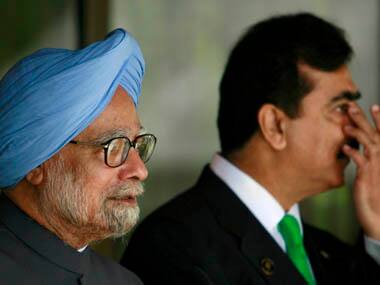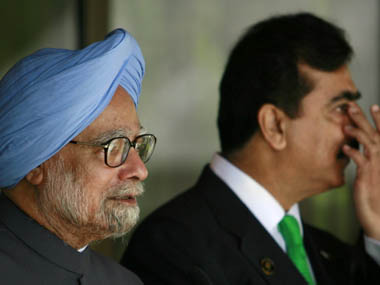Prime Minister Manmohan Singh is today a man in desperate search of a legacy. He once gained acclaim as the architect of the economic reforms of 1991 — although,
as Firstpost has noted earlier
, he was merely the babu who implemented it under duress – and under the political stewardship of PV Narasimha Rao. But whatever karma points he may have acquired then have been squandered in his two tenures as Prime Minister. His reformist credentials – such as they are – are now in tatters, and his legacy risks being tarnished by the monumental corruption scandals that happened under his watch. What can such a scarred man do to ride off into the sunset with dignity? Well, how about burnishing his reputation by reinventing himself as a “peacemaker”? As someone who, against formidable odds, ushered in “peace” with Pakistan? Such an ambition evidently resonates with Manmohan Singh, going by the alacrity with which his government has responded to Pakistan’s recent overtures to demilitarise the Siachen Glacier. The proposal was floated by Pakistan’s Army Chief Gen Ashfaq Parvez Kayani, during a recent visit to Skardu to oversee rescue operations following the avalanche that claimed the lives of over 140 Pakistani soldiers. (
More here
.) Taken with other recent pacific signals emanating from Pakistan, it signalled the launch of a charm offensive and a public relations blitz by Pakistan. (
More here
.) [caption id=“attachment_301253” align=“alignleft” width=“380” caption=“Is Manmohan Singh hoping to burnish his reputation by reinventing himself as a “peacemaker”? Reuters”]
 [/caption] And now the Indian government appears to be keen to reciprocate the sentiments. Last week, Defence Minister AK Antony said that the government was holding a meaningful dialogue with Pakistan to demilitarise the Siachen Glacier. Antony said that defence secretaries from both sides would meet in Islamabad later this year to prepare the groundwork for an agreement, the blueprint for which was drawn up in the 1980s by Prime Ministers Rajiv Gandhi and Benazir Bhutto. But the political push for an agreement is meeting with understandable pushback from the Indian army, which secured strategic advantage in the Glacier in 1984 and argues vehemently against yielding it to an adversary that is unreliable. “The Indian Army, which won the battles for Siachen, is determined to prevent politicians from surrendering what soldiers won through blood and sacrifice,” notes India Today in its latest edition. (The article is not available online, but
you can read an excerpt here
.) The report quotes unidentified sources in government as saying that Manmohan Singh has endorsed the Siachen talks – perhaps with an eye on securing his legacy as a peacemaker and, who knows, perhaps even a Nobel Peace Prize! But Army officers and strategic analysts are steadfastly against giving away a hard-won advantage on Siachen merely on the strength of overtures from Pakistan, which has played a perfidious double role in the past whenever India lowered its guard. Within months of Prime Minister AB Vajpayee travelling to Lahore by bus, for instance, Pakistani troops sneaked into Kargil, from where they were pushed back after strenuous efforts. If the civilian administration is set on withdrawing Indian troops from Siachen, the Army must of course perforce comply. But in the context of recent tensions between the Army chief Gen VK Singh and the civilian government, the Siachen issue is becoming another potential source of friction. The magazine quotes an unidentified Army source as saying that if Gen VK Singh is ordered to withdraw Indian troops form Siachen, “he would seek an order in writing and given an opinion opposing withdrawal in writing.” The reason for disquiet among Army officers is clear: Pakistan cannot be trusted. “Pakistan has violated every written agreement and verbal commitment since 1947,” Lt Gen Ravi Sawhney, former Director-General of Military Intelligence, told the magazine. “Why does our Prime Minister want to close his eyes to hard facts and trust Pakistan blindly? Former Army chief VP Malik too points out that there are no guarantees that Pakistan will not occupy the heights vacated by India. Whenever strategic analysts raise the red flag against initiatives such as these, which give away land here and now in exchange for the promise for peace for eternity, they are accused of being hurdles in the path of reconciliation. But such an argument misses the point: the objection is not to peace initiatives, which are surely welcome, but to the recklessness that accompanies an eagerness to secure peace at any cost, without adequate consideration to Pakistan’s record of double-crossing. In any case, Siachen today holds strategic importance for India beyond Pakistan: given the presence of Chinese troops in Pakistan-occupied Kashmir and in Gilgit-Baltistan, India’s hold on Siachen allows it to interject the Pakistan-China axis. An excessive eagerness to secure peace at any cost with Pakistan comes with enormous risks of a surrender of strategic advantage. Nothing is worth that cost: not even the prospect of a Nobel Peace Prize and a legacy as a peacemaker.
[/caption] And now the Indian government appears to be keen to reciprocate the sentiments. Last week, Defence Minister AK Antony said that the government was holding a meaningful dialogue with Pakistan to demilitarise the Siachen Glacier. Antony said that defence secretaries from both sides would meet in Islamabad later this year to prepare the groundwork for an agreement, the blueprint for which was drawn up in the 1980s by Prime Ministers Rajiv Gandhi and Benazir Bhutto. But the political push for an agreement is meeting with understandable pushback from the Indian army, which secured strategic advantage in the Glacier in 1984 and argues vehemently against yielding it to an adversary that is unreliable. “The Indian Army, which won the battles for Siachen, is determined to prevent politicians from surrendering what soldiers won through blood and sacrifice,” notes India Today in its latest edition. (The article is not available online, but
you can read an excerpt here
.) The report quotes unidentified sources in government as saying that Manmohan Singh has endorsed the Siachen talks – perhaps with an eye on securing his legacy as a peacemaker and, who knows, perhaps even a Nobel Peace Prize! But Army officers and strategic analysts are steadfastly against giving away a hard-won advantage on Siachen merely on the strength of overtures from Pakistan, which has played a perfidious double role in the past whenever India lowered its guard. Within months of Prime Minister AB Vajpayee travelling to Lahore by bus, for instance, Pakistani troops sneaked into Kargil, from where they were pushed back after strenuous efforts. If the civilian administration is set on withdrawing Indian troops from Siachen, the Army must of course perforce comply. But in the context of recent tensions between the Army chief Gen VK Singh and the civilian government, the Siachen issue is becoming another potential source of friction. The magazine quotes an unidentified Army source as saying that if Gen VK Singh is ordered to withdraw Indian troops form Siachen, “he would seek an order in writing and given an opinion opposing withdrawal in writing.” The reason for disquiet among Army officers is clear: Pakistan cannot be trusted. “Pakistan has violated every written agreement and verbal commitment since 1947,” Lt Gen Ravi Sawhney, former Director-General of Military Intelligence, told the magazine. “Why does our Prime Minister want to close his eyes to hard facts and trust Pakistan blindly? Former Army chief VP Malik too points out that there are no guarantees that Pakistan will not occupy the heights vacated by India. Whenever strategic analysts raise the red flag against initiatives such as these, which give away land here and now in exchange for the promise for peace for eternity, they are accused of being hurdles in the path of reconciliation. But such an argument misses the point: the objection is not to peace initiatives, which are surely welcome, but to the recklessness that accompanies an eagerness to secure peace at any cost, without adequate consideration to Pakistan’s record of double-crossing. In any case, Siachen today holds strategic importance for India beyond Pakistan: given the presence of Chinese troops in Pakistan-occupied Kashmir and in Gilgit-Baltistan, India’s hold on Siachen allows it to interject the Pakistan-China axis. An excessive eagerness to secure peace at any cost with Pakistan comes with enormous risks of a surrender of strategic advantage. Nothing is worth that cost: not even the prospect of a Nobel Peace Prize and a legacy as a peacemaker.
Venky Vembu attained his first Fifteen Minutes of Fame in 1984, on the threshold of his career, when paparazzi pictures of him with Maneka Gandhi were splashed in the world media under the mischievous tag ‘International Affairs’. But that’s a story he’s saving up for his memoirs… Over 25 years, Venky worked in The Indian Express, Frontline newsmagazine, Outlook Money and DNA, before joining FirstPost ahead of its launch. Additionally, he has been published, at various times, in, among other publications, The Times of India, Hindustan Times, Outlook, and Outlook Traveller.
)